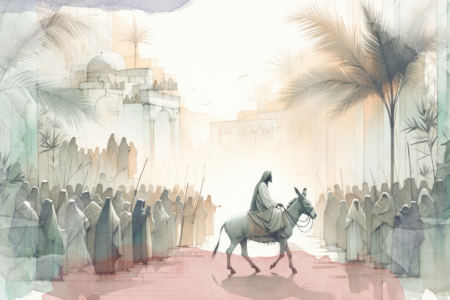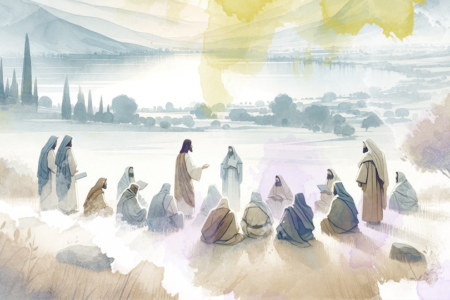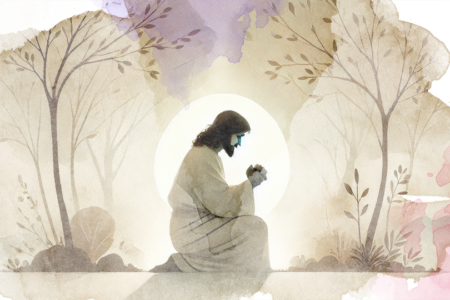The Life, Times And Message Of Isaiah The Prophet Oct/Nov 1972
A MESSAGE OF COMFORT AND HOPE FOR ISRAEL AND THE NATIONS
ISAIAH CHAPTER 51
1-3 Those who do Jehovah’s will, though few in number, will in the end experience the mercy of God.
1 Listen to me, you who follow righteousness,
You who seek the LORD,
Look to the rock from which you were hewn,
And to the hole of the pit from which you were dug.
2 Look unto Abraham, your father,
And to Sarah, who gave you birth,
For he was just one when I called him,
Yet I blessed him and made many of him.
3 For the LORD has comforted Zion,
He has comforted all her desolate places,
And made her wilderness like Eden,
And her desert like the garden of the LORD.
Joy and gladness shall be found in her,
Thanksgiving and the voice of melody.
Comment:
1 Listen to me, you who follow righteousness
Literally “you who pursue righteousness,” that is, you who intensely search out and practice righteousness. They are the people who seek God and are anxious to do His will. Presumably there were not many such “righteous men” among the exiles, and they were in a mood of despondency. What could a mere handful of God-fearing men accomplish, surrounded as they were, by the indifference of their own countrymen and the crushing power of their pagan captors? Was there any hope for them?
2 Look unto Abraham your father and to Sarah
The believers in bondage were encouraged to remember that they were cut from the same rock and quarry as their original ancestors, Abraham and Sarah. The whole history of Israel was proof that Jehovah is the God of the impossible. There they were, an old couple, long after their childbearing age had passed, and look what God did! He made Abraham the father of Israel and of many nations.
3 For the LORD has comforted Zion
The promise is expressed in the prophetic past. What Jehovah is planning to do for His people in the future, is to the prophet an already accomplished fact. Jerusalem shall be rebuilt, and the desolate land shall become like Eden, a garden of the LORD.
Joy and gladness . . . . . . the voice of melody
The prophet’s vision reaches out beyond any historical limits and becomes eschatology, a vision of the last days as He sees Israel returning, not only to their native land, but to their God.
4-8 In the end Jehovah will establish His kingdom of righteousness and salvation for Israel and all nations.
4 Attend to me, O my people,
And give ear unto me, O my nation,
For the Law shall go forth from me,
And my judgment shall suddenly become
The light of the peoples.
5 My righteousness is near,
My salvation has gone forth.
My arm shall judge the nations.
The coastlands shall wait for me,
And will trust in my arm.
6 Lift up your eyes toward heaven,
And look down upon the earth,
For the heavens shall dissolve like smoke,
And the earth shall wither away like a garment,
And they who dwell upon it shall die likewise;
But my salvation shall be for ever,
And my righteousness shall never cease.
7 Listen to me, you who know righteousness,
People in whose hearts is my law;
Fear not the taunt of men,
And be not dismayed by their insults.
8 For the moth shall eat them up like a garment,
And the insect shall devour them like wool,
But my righteousness shall abide for ever,
And my salvation for all generations.
Comment:
4 Attend to me, O my people
The call is addressed to the remnant of Israel, the spiritual core of the nation.
For the Law shall go forth from me
Here “the Law” is not the Law of Moses which was primarily revealed to and for Israel. The prophet speaks of the supreme Law, of which the fountainhead and spring is the Lord God Himself. This is the Law and the light of all mankind (cf. Rom. 2:14-15, Jn. 1:4).
And my judgment shall suddenly become the light of the peoples
The law, or the judgment of God, is the eternal logos (Jn. 1:1). Yet its manifestation in history is sudden and unexpected. This is what the Hebrew verb argi-a, “will suddenly appear,” from “regah” – a moment, suggests.
5 The coastland shall wait for me and shall trust in my arm
An essential part of the prophetic message is the conviction that all nations which from the beginning of time have lived in the thraldom of sin and wickedness have always, consciously or unconsciously, waited for true righteousness, the Law of God.
6 Lift up your eyes toward heaven, and look down upon the earth
All that which is visible to the human eye shall one day disappear, only the mercy and the salvation of God will abide forever. Jesus, identifying Himself with His Father declared:
Heaven and earth shall pass away, but my words shall not pass away (Mt. 24:35).
7-8 These verses repeat and reinforce the thoughts expressed in verses 4-6, with the added exhortation:
7 Fear not the taunt of men and be not dismayed by their insults
Believing in the eternal and omnipotent God, men of faith ought not to fear the taunts and insults of “enosh” – a weak, ephemeral being, “mere man”.
9-11 The mighty arm of Jehovah is invoked to deliver Israel
9 Awake, awake, put on thy strength, O arm of the LORD.
Awake as in olden days, in ancient generations.
Art thou not He who cut up Rahab,
That pierced the dragon?
10 Art thou not he, who dried up the sea
The waters of the great deep?
Who turned the depths of the sea into a road
For the redeemed to pass over?
11 And the ransomed of the LORD shall return,
And shall come to Zion with singing.
Everlasting joy shall be upon their heads.
Sorrow and sighing shall flee away.
Comment:
9-11 “The arm of the LORD” is a metaphor for Divine omnipotence and is invoked to manifest itself in a mighty act of deliverance, as in the days of old.
9 Art thou not He who cut up Rahab?
Egypt is called Rahab, a mythical sea monster (Isa. 30:7), which is involved in the story of creation in pagan mythology. The dragon is another primeval monster representing the restless forces of the sea (Job 9:13).
10 Art thou not He, who dried up the sea
This seems to be a double allusion first to the act of creation (Gen. 1:9), and then to the exodus from Egypt. The remembrance of the mighty acts of God in creation and in history bring conviction to the prophet, that the LORD will again manifest His might and redeeming grace.
11 And the ransomed of the LORD shall return
As always, the prophet looks beyond the immediate situation toward the ultimate redemption, which is so beautifully described here. In the prophet’s vision, history is the background canvas for the “ultimate days” when the Messianic King, or the suffering and exalted Servant of God, shall reign over all the kingdoms of the earth.
12-16 Seeing that Jehovah is the defender of Israel, why should His people live in constant terror of mortal man?
12 I, I myself am He who comforts you,
Who art thou to fear feeble and mortal man,
Or the son of man who will become as the grass?
13 And hast forgotten the LORD thy maker,
Who planted the heavens and laid the foundation of the earth,
And fearest all day long the fury of the oppressor,
As he gets ready to destroy,
And where is the fury of the oppressor?
14 He that is bent over shall speedily be released,
And will not die in the dungeon,
Neither shall he be short of his bread.
15 For I am the LORD thy God,
Who stirs up the sea, so that its waves roar,
The LORD of hosts is His name.
16 And I have put my words in thy mouth,
And hid thee in the shadow of my hand,
That I may plant the heavens,
And lay the foundation of the earth,
And that I may say to Zion: Thou art my people.
Comment:
12 I, I myself am He who comforts you
Who art thou to fear feeble and mortal man?
As the mouthpiece of God, the prophet remonstrates with his people: since the omnipotent LORD Himself is their comforter and defender, why should Israel be in dread of an “enosh”, a feeble and mortal man?
13 And where is the fury of the oppressor?
While they live, the raging of the enemy appears to be most frightening, but when their fury is spent and they are gone, their boasting seems to be the pitiful raving of a puny man.
14 He that is bent over . . . . will not die in the dungeon
Those who are now bent under the yoke of captivity will not die as prisoners, nor perish of hunger, but will soon experience the redemption of God.
15 For I am the LORD thy God, who . . . .
Jehovah, the creator and controller of all nations, is the guarantor of all His promises that they shall be fulfilled.
16 And I have put my words in thy mouth
Jehovah has entrusted His revelation to His people to make it known to the nations.
And hid thee in the shadow of my hand
A most beautiful expression of God’s love and protection of His people, which all believers could also apply to themselves individually.
That I may plant the heavens and lay the foundation of the earth
Some interpreters have considered this passage hopelessly confused and out of harmony with the preceding thoughts (Skinner). That might be so, if the prophet had been referring to the original creation previously mentioned in v. 13. However, if we regard this as a promise of a new creation, of a new heaven and a new earth, filled with the righteousness of God, and where restored and redeemed Israel is again the people of God, then the passage makes beautiful sense. This apparently was what the prophet had in mind. (cf. Is. 65:17)
17-33 A call to prostrated Jerusalem to wake up and shake off the stupor of her enslavement and suffering.
17 Bestir thyself, bestir thyself, stand up, O Jerusalem,
Thou who hast drunk from the hand of the LORD,
The cup of his fury, the chalice of stupor,
Which thou hast drunk and drained.
18 Of all the sons to whom she gave birth,
There is none to guide her,
Of all the sons which she has reared,
There is none to take her by the hand.
19 These twin horrors have befallen thee:
Who is there to mourn for thee?
Devastation and destruction,
Hunger and the sword,
How shall I comfort thee?
20 Thy sons are worn out,
And lie panting at every street corner,
Like an antelope in the net.
They are saturated with the fury of the LORD,
With the rebuke of the LORD.
21 Hear then this, thou afflicted,
Who art drunk, but not with wine:
22 Thus says thy LORD Jehovah
And thy God who champions thy cause.
Behold I have taken out of thy hand
The cup of stupor, and the chalice of my fury,
Thou shalt drink of it no more.
23 But I will put it into the hands of thy tormentors,
Those who said to thy soul:
Bend down, that we may pass over,
And thou hast flattened thy back to the ground,
And made it like a street to pass over.
Comment:
17 Bestir thyself, bestir thyself, stand up, O Jerusalem
Jerusalem has long lain prostrate and bewildered by the bitter cup of divine fury, which she has had to drink to the last bitter drop. Now the time has come to bestir herself and to rise up to her full dignity, as befitting the people of God.
18 Of all the sons to whom she gave birth, there is none to guide her
Jerusalem’s tragedy is made even more pitiful, that in the hour of her extreme need she has none of her sons to guide her.
19-20 These two verses graphically describe the pitiful plight of Jerusalem. The scene is so dramatic that it hardly needs any comment. Devastation and destruction, hunger and the sword are the disasters which have come upon Jerusalem. We sense the horror of the unfortunate people of Jerusalem. The tone is reminiscent of the Lamentations of Jeremiah. The sons of Israel are likened to captured wild animals, which lie panting in their nets, exhausted and frightened.
21-33 Now, however, the LORD is announcing a new message for His prostrated nation. The cup of suffering and stupefaction is at last to be removed from her hand and passed on to her tormentors.
23 Who said to thy soul bend down that we may pass over
“Thy soul” here simply means “to thee.” The above words are no mere poetic license, but a description of a cruel custom, practiced by the Assyrians, the Babylonians and other Oriental conquerors, who made their captives lie down and walk over them. Such scenes were often depicted on ancient monuments.
LET JERUSALEM ARRAY HERSELF IN ALL HER BEAUTY AS BEFITTING THE DIGNITY OF A REDEEMED AND HOLY CITY
ISAIAH CHAPTER 52:1-12
1-6 Jerusalem’s redemption is at hand, for the Lord’s honor is at stake
1 Awake, awake, put on thy strength, O Zion,
Put on thy beautiful garments, O Jerusalem, holy city,
For from now on shall no longer
The uncircumcised and unclean come into thee.
2 Shake thyself from the dust,
Arise and sit down, O Jerusalem,
Loosen thyself from the cords of thy neck,
O captive daughter of Zion.
3 For thus says the LORD:
You were sold for nothing,
And you shall be redeemed without money.
4 For thus says the LORD Jehovah,
At the beginning My people went down to Egypt to sojourn,
Later the Assyrian oppressed them without cause.
5 And now what do I find here?
Seeing that My people were taken away for nothing,
And they who rule over them are boasting, says the LORD,
And My name is constantly and all day blasphemed.
6 Therefore will My people know My name,
Therefore on that day will they know,
That I am He who speaks, behold I am here.
Comment:
1 Awake, awake, put on thy strength, O Zion
In ringing tones Zion is commanded to cast off the chains of her captivity, and to array herself in the beautiful garments of her redemption.
For from now on shall no longer the uncircumcised and unclean come into thee
This is no xenophobic sentiment, that henceforth no Gentile shall be permitted to enter Jerusalem, but a promise that the pagan who in the past came to plunder and destroy the Holy City will no longer be permitted to do so.
2 Shake thyself from the dust, arise and sit down
On the face of it, “arise and sit down” sound contradictory. What the prophet apparently is saying is that the captives should shake off the dust of defeat and humiliation, and assume the posture and dignity of the redeemed. This might be paraphrased “arise from the dust and sit down on the throne.”
3 You were sold for nothing and you shall be redeemed without money
Jehovah received no payment for Israel from her captors, and He will also set them free without paying a ransom price to them.
4 At the beginning my people went down to Egypt to sojourn
The Israelites went down to Egypt at the invitation of Pharaoh, but were soon enslaved by the Egyptians. However, God led them out from there. Later they were again enslaved by the Assyrians “for nothing”, that is, without any moral or legal right. But Jehovah delivered them from the Assyrians, who were in turn defeated by the Babylonians (612 B. C.).
5 And now what do I find here?
What is the situation which the Lord sees in Babylon? His people are cruelly mistreated, while their captors strut and boast and constantly blaspheme His Holy Name as if their idols had vanquished Jehovah.
6 Therefore will My people know My name
“To know the name” is to know intimately the character of the person who bears the name. In this case Israel will know that Jehovah is mighty to deliver, her faithful and promise keeping God.
7-12 The prophet’s vision of the homeward march of the exiles led by Jehovah Himself.
7 How beautiful on the mountains
Are the feet of the messenger,
Who announces peace, proclaims good news, announces salvation,
And says to Zion: Thy God reigns.
8 Hark, thy watchmen lift up their voice,
They sing together,
For they shall see, eye to eye,
The LORD returning to Zion.
9 Break forth into joy, sing together,
You ruins of Jerusalem,
For the LORD has comforted His people,
He has redeemed Jerusalem.
10 The LORD has bared His holy arm,
Before the eyes of all nations;
And all the ends of the earth,
Shall see the salvation of our God.
11 Depart, depart, get out from there,
Touch not anything unclean,
Get out of her, make yourselves clean,
You who carry the vessels of the LORD.
12 For you shall not depart in haste,
Neither shall you go by flight,
For the LORD shall go before you,
And your rear-guard shall be the God of Israel.
Comment:
7 How beautiful on the mountains are the feet of the messenger
The prophet visualizes in spirit a fleet-footed messenger on the mountains of Judah, bringing the good tidings that the exiles, under Jehovah Himself, are returning to Zion in triumph. The apostle Paul sees in this messenger the figure of the evangelist who brings the good tiding (“the evangel”) of salvation to Israel (Rom. 10:13).
8 Hark, thy watchmen lift up their voice
Meanwhile the watchmen upon the walls of Jerusalem, are the first to observe the triumphant return of the exiles under the guidance of Jehovah Himself.
9 Break forth into joy, sing together, you ruins of Jerusalem
The ruins of Jerusalem are encouraged to participate in the triumphant return of those who once inhabited the glorious city.
10 The LORD has bared His holy arm
The metaphor applied to “the arm of Jehovah” is taken from an ancient warrior’s stance, as he throws back his upper garment from his right shoulder, in readiness for battle.
11 Depart, depart, get out from there
With a brusque command the exiles are ordered to leave Babylon. The phrase “from there” as we have already indicated in the introduction to this volume, would appear to place the prophet somewhere far removed from Babylon. This is consistent with the view that the author of both parts of the book was Isaiah, a resident of Jerusalem.
Touch not anything unclean
As a redeemed and holy people, they must not defile themselves ritually or morally (Lv. 23:14). This applied particularly to the Levites who, according to the decree of Cyrus (Ezra 6:5), were to carry back to Jerusalem the vessels of the Temple. In a larger sense all Israel was to be “the carrier of the vessels of the LORD, of His holiness, His righteousness and of His light to the ends of the earth.”
12 For you shall not depart in haste
In contrast to Israel’s hasty departure from Egypt from the pursuing Pharaoh, the departure from Babylon would be leisurely, in full sight of, and with the cooperation and goodwill of Cyrus, whom the LORD has previously called “My shepherd” (Isa. 44:28) and “anointed” (Isa. 45:1).
For the LORD shall go before you
Here we have a majestic portrayal of Jehovah, marching at the head of His liberated and redeemed people and at the same time safeguarding their rear from enemy attack, (see also Is. 58:8).
(to be continued)







